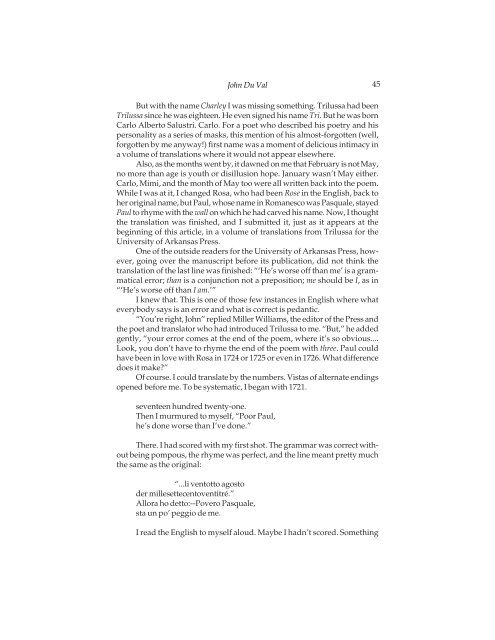Journal of Italian Translation
Journal of Italian Translation
Journal of Italian Translation
Create successful ePaper yourself
Turn your PDF publications into a flip-book with our unique Google optimized e-Paper software.
John Du Val<br />
But with the name Charley I was missing something. Trilussa had been<br />
Trilussa since he was eighteen. He even signed his name Tri. But he was born<br />
Carlo Alberto Salustri. Carlo. For a poet who described his poetry and his<br />
personality as a series <strong>of</strong> masks, this mention <strong>of</strong> his almost-forgotten (well,<br />
forgotten by me anyway!) first name was a moment <strong>of</strong> delicious intimacy in<br />
a volume <strong>of</strong> translations where it would not appear elsewhere.<br />
Also, as the months went by, it dawned on me that February is not May,<br />
no more than age is youth or disillusion hope. January wasn’t May either.<br />
Carlo, Mimi, and the month <strong>of</strong> May too were all written back into the poem.<br />
While I was at it, I changed Rosa, who had been Rose in the English, back to<br />
her original name, but Paul, whose name in Romanesco was Pasquale, stayed<br />
Paul to rhyme with the wall on which he had carved his name. Now, I thought<br />
the translation was finished, and I submitted it, just as it appears at the<br />
beginning <strong>of</strong> this article, in a volume <strong>of</strong> translations from Trilussa for the<br />
University <strong>of</strong> Arkansas Press.<br />
One <strong>of</strong> the outside readers for the University <strong>of</strong> Arkansas Press, however,<br />
going over the manuscript before its publication, did not think the<br />
translation <strong>of</strong> the last line was finished: “‘He’s worse <strong>of</strong>f than me’ is a grammatical<br />
error; than is a conjunction not a preposition; me should be I, as in<br />
“‘He’s worse <strong>of</strong>f than I am.’”<br />
I knew that. This is one <strong>of</strong> those few instances in English where what<br />
everybody says is an error and what is correct is pedantic.<br />
“You’re right, John” replied Miller Williams, the editor <strong>of</strong> the Press and<br />
the poet and translator who had introduced Trilussa to me. “But,” he added<br />
gently, “your error comes at the end <strong>of</strong> the poem, where it’s so obvious....<br />
Look, you don’t have to rhyme the end <strong>of</strong> the poem with three. Paul could<br />
have been in love with Rosa in 1724 or 1725 or even in 1726. What difference<br />
does it make?”<br />
Of course. I could translate by the numbers. Vistas <strong>of</strong> alternate endings<br />
opened before me. To be systematic, I began with 1721.<br />
seventeen hundred twenty-one.<br />
Then I murmured to myself, “Poor Paul,<br />
he’s done worse than I’ve done.”<br />
There. I had scored with my first shot. The grammar was correct without<br />
being pompous, the rhyme was perfect, and the line meant pretty much<br />
the same as the original:<br />
“...li ventotto agosto<br />
der millesettecentoventitré.”<br />
Allora ho detto:--Povero Pasquale,<br />
sta un po’ peggio de me.<br />
I read the English to myself aloud. Maybe I hadn’t scored. Something<br />
45
















